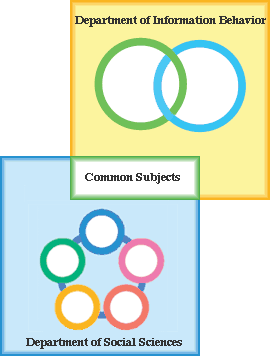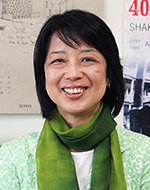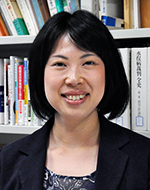
Reserch
Faculty of Social and Information Studies
The scalpel of solution for a changing society
The academic field of Social Information Studies was created in response to the rapidly expanding modern, advanced information society that confronts us today. As a result of this rapid expansion, this society is undergoing drastic changes in a wide range of fields, from the way we work and study, the newly acquired roles of politics and economics and even the way we carry out our consumption and leisure activities. Solving the plethora of problems that arise from these and other major changes requires a diversified and comprehensive understanding as well as ramifications that are beyond the limits of response in currently existing academic fields of endeavor.
Our faculty members are all specialists in fields such as information science, the humanities, social science and environmental science. Also, as they take full advantage of the knowledge and experience of their peers, each of these specialists is involved in investigations designed to find solutions and measures that can deal effectively with the problems that accompany an advanced information society.
Based upon a comprehensive understanding of our advanced information society, students pursuing their studies in this faculty acquire the ability to grasp problems as they arise from an ever-broadening perspective. They acquire the capacity to respond to any situation that might arise in a flexible and impromptu matter through our educational policies designed to train students to develop the practical skills and abilities necessary to solve problems. The graduates of this faculty after studying such a curriculum move on to assume leading roles in a wide range of fields that include the information service industry, mass media, civil service, financial and distribution services. 驍オ・イ・つThe Faculty of Social & Information Studies offers majors in Information Behavior Science and in Social Sciences in the modern Information Societies. 驍オ・イ・つIn either of these majors, it is possible to develop a broad understanding of the information society as a whole through studying commonly offered faculty subjects and to gain a deeper understanding of this information society through the further study of specialized subjects. In this same manner, through a learning process that encourages a broad approach to learning throughout a wide range of fields, it is also possible to pick up new interests in the process of acquiring the ability to respond to an advanced information society.
Department of Informatin Behavior

By focusing on the fields of information, students deal with solving problems that exist in society. The division into two courses; Information Media and Information Systems, makes it possible for students to approach their solutions by learning from the viewpoints of both “human beings” and “decision-making-support”.
As students develop a deep awareness to the problems that exist within our society, based upon the existence of facts, they are able to expand their own minds through the effective use of the information and media that encompasses mankind for solving these problems.
Department of Social Sciences
Students grasp the posture of the information society and analyze it through their coursework based upon a solid foundation in the social sciences. In this case, students may freely establish their own curriculum for advanced study by selecting courses from the 5 social science subjects.
By firmly learning about existing theories, students acquire the ability to analyze society and establish an accurate grasp of all of the mechanisms that are involved in moving the information society.
Web Archive A|S|I|A

Michiko Suematsu
Professor, Teaches at Gunma University since 1992.
A joint author of Shakespeare in Asia: Contemporary Performance (2010) and Study of Shakespeare Performances in Japan Today (Nihon no Shakespeare Jouen Kenkyu no Genzai, 2010)
Shakespeare studies in Japan have traditionally centered on interpretations of texts only. It was only in the comparatively recent years of the 1990s that researchers began to work on performances of his plays as study subjects. As a member of a Shakespeare performance circle at university, I myself was interested in Shakespeare performances and therefore became engaged in a comparative study of Shakespeare performances in the United Kingdom and Japan. As a result of these studies, I met Asian researchers at international conferences and through exchanges with them, a web archive --- A|S|I|A (Asian Shakespeare Intercultural Archive) --- was born.
As a result of this web archive being constructed through the cooperative efforts of researchers from Japan, Korea and Singapore, you can view videos of full performances of Shakespeare's plays performed in Asian countries with captions in three languages (Japanese, Chinese and English), read programs and interviews with performers, and search for detailed information on performance analyses. By digitizing drama performances, which possess strong one-time-onlyness by nature, the archive provides an environment in which one can view videos of performances very easily on a personal computer and make detailed comparative analyses.
A|S|I|A now has 34 works performed in Japan, China, Korea, Malaysia, Singapore, Taiwan and the Philippines. As expressed by the word “Intercultural,” the web archive informs us as to how the works of Shakespeare and various Asian cultures have been mixed with each other.
A|S|I|A URL: http://a-s-i-a-web.org/ ![]()
Survey Report on the Fukushima Nuclear Power Plant Accident

Yoshiko Nishimura
Professor, Teaches at Gunma University since 2000.
The author of the thesis “A Survey Report on Evacuees of Great East Japan Earthquake who live in Gunma Prefecture.”
As a part of Gunma University’s regional contribution projects in the academic year 2012-2013, we conducted a questionnaire and interview survey of evacuees displaced by the Great East Japan Earthquake and the subsequent accident at the Fukushima Daiichi nuclear power plant living in Gunma Prefecture. The purpose of the survey was to learn about the hardships evacuees suffered, their lives as evacuees, the problems they face that need to be resolved, and to ascertain the forms of current support measures. Twenty-eight students participated in the interview survey and we jointly prepared a report.
As of August 2012, when the survey was conducted, there were 1,913 evacuees in Gunma Prefecture, of whom 1,791, or about 94%, were from Fukushima Prefecture. Of the questionnaires delivered to 680 families, 185, or 27%, were collected and we interviewed 40 families. Below are some excerpts from the survey results. About 24% of evacuated families replied “We have not applied to Tokyo Electric Power Company (TEPCO) for compensation.” To the question “Have you consulted specialists or participated in briefings?” about 52% answered “No,” while about 80% replied that they were dissatisfied with the scope and amount of payment offered by TEPCO.
The procedures for claiming compensation are not only time consuming, they also are very complicated. Many evacuees have written or voiced issues such as: “We don’t know what to do,” “The briefing venues are too far away to attend,” “We have no time to consult with specialists due to work or caring for family,” and “We have abandoned hope of receiving compensation because we are voluntary evacuees.” These results reconfirmed to us the necessity of special support for elderly or handicapped people and single-mother families. Our survey also revealed a situation in which voluntarily evacuating families have been forced into difficult positions both economically and mentally because of insufficient compensation and understandings by others.
